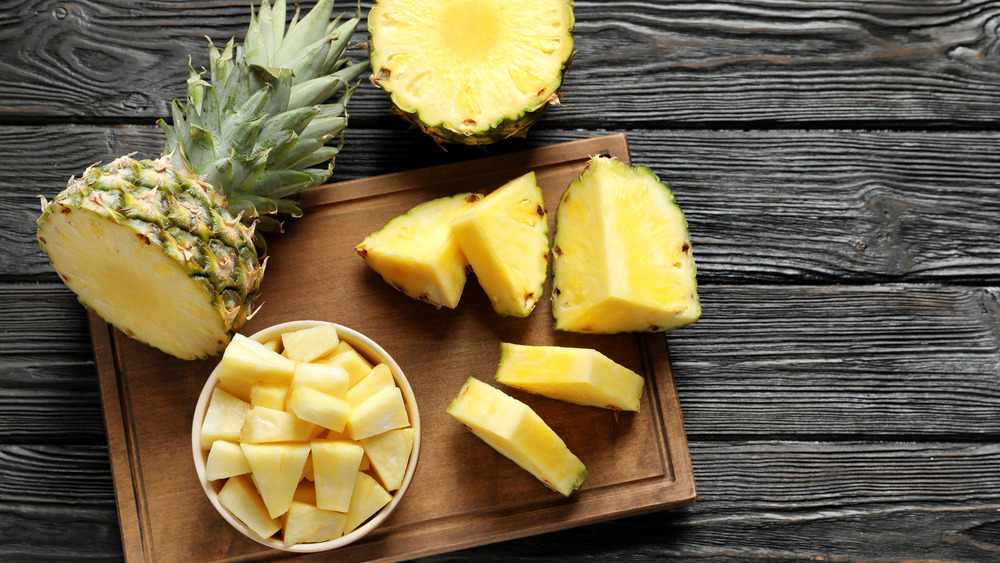What You Can Do To Keep Pineapple From Hurting Your Tongue
If you tend to think twice before reaching for a juicy piece of pineapple in fear that it might cause the inside of your mouth to burn and feel irritated, you are not alone. While some may experience a legitimate allergic reaction to the tropical fruit, the discomfort felt on your tongue, cheeks, or the roof of your mouth after biting down on a piece of pineapple is likely the effect of an enzyme called bromelain, which occurs naturally in the fruit (via Livestrong).
According to Bon Appétit, bromelain is a chemical found in pineapples that has highly corrosive qualities due to the two protein-eating enzymes — known as proteases — it is composed of. The two enzymes that make up bromelain work together to quickly and efficiently break down amino acids, which means that the discomfort you feel in your mouth when eating pineapple is most likely just the enzyme mixture doing what it does best in your mouth, making the fruit have an extra acidic punch.
How to avoid the pineapple burn
Luckily, any damage caused by bromelain in pineapple is naturally reversed when the body regenerates the damaged cells, meaning that you shouldn't feel any prolonged symptoms (via Bon Appétit). Additionally, while bromelain can wreak oral havoc on its way in, it is not likely to cause any pain during digestion because it is easily broken down by stomach acid (via Livestrong). In other words, your stomach can handle it, but your mouth can't.
In extreme cases, raw pineapple can irritate the lining of your mouth to the point of mild blood loss, according to Spoon University. However, while its effectiveness in breaking down proteins may make bromelain a sworn enemy of the tongue, its powerful qualities make the chemical — and the fruit it is found in — an ideal tenderizer for meat (via HuffPost).
Because the highest concentration of bromelain in pineapple can be found within its core, or stem, one way to reduce the amount of pain experienced from a piece of juicy pineapple is to make sure its core is removed completely before consuming. Additionally, Bon Appétit advises that soaking chunks of pineapple in salted water overnight can minimize the effects.
However, the only way to truly remove the destructive enzyme is by applying enough heat to cook the pineapple. Cooking the pineapple, whether by grilling it, roasting, or even baking, will break down the bromelain found in pineapple to a level where it won't hurt to eat it.
Is it the bromelain or an allergy to pineapple?
If you've been advised to let your diced pineapple rest at room temperature in an attempt to reduce irritation, but still find it uncomfortable to eat, it may be because bromelain can survive at room temperature for up to a week (via Spoon University). However, pairing pineapple with a creamy dairy product, such as yogurt or ice cream, provides a secondary protein for bromelain to feast on while also neutralizing the pH levels in the fruit.
While bromelain is known to cause an uncomfortable burning sensation in the mouth, if you feel a different type of discomfort while eating pineapple, like itchiness, it's possible that you may be allergic to the fruit. Oral allergy syndrome (or pollen-food sensitivity syndrome), manifests when individuals who suffer from pollen allergies feel itching or swelling in their mouth, throat, lips, or face after eating fruits like apples, celery, melon, or pineapples (via Livestrong).
However, this allergy isn't actually triggered by pollen inside the fruit. Some fruits contain similar proteins to those that are found in pollen, which confuses the immune system and triggers an allergic response. And although symptoms for this allergy are typically mild, it's important to differentiate whether the discomfort you feel after eating pineapple is caused by bromelain, or a result of oral allergy syndrome, as serious cases of the latter can lead to severe throat swelling that could potentially impede your ability to breathe efficiently.


